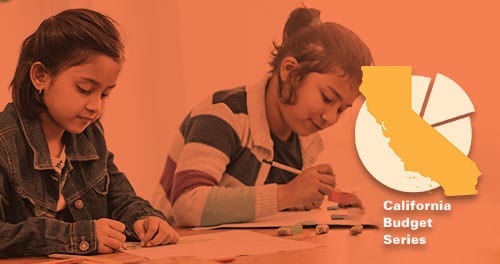Editor’s note: This is the second of a three-part series, in which our experts delve into the details of California Governor Gavin Newsom’s January budget proposal. Previously we examined the Governor’s proposals for higher education. Part three will focus on early childhood.
Much of our work at the Education Trust–West (ETW) is predicated on a simple reality: systems produce the results they are designed to produce. Since its inception, California’s education system, like so many of our institutions, has been designed to preserve a status quo that routinely fails students of color, students from lower-income communities, English learners, and other historically marginalized students. As my colleague Manny Rodriguez wrote last week, the COVID-19 pandemic did not create the injustices in our education system, but it has laid them bare. Now, we’ve been presented with a chance to begin addressing them.
Governor Newsom’s budget proposes $6.6 billion in critically important investments with an eye towards bringing students back to in-person learning, and supporting students and the education system to recover from school building closures and the pandemic. But those investments are only as valuable as the Governor and Legislature choose to make them. To support an equitable recovery and build a foundation for a more inclusive future, the money must be distributed in a way that prioritizes justice.
First the good news: the Governor’s budget includes meaningful investments in areas that are especially critical right now.
 Governor Newsom proposes $450 million to support K-12 students’ mental health needs. Students are dealing with stress and trauma like never before. That’s especially true for students of color, who are more likely to have family and friends battle COVID-19 than their peers. Students from lower income communities have also experienced parents lose jobs and often have to go to work themselves to support their families. For older students, the pandemic has often meant not just a change to their own education but taking responsibility for the care and education of younger siblings. On the whole, many students are at or beyond their breaking point, and education leaders will need to do everything in their power to tend to students’ mental health needs—not just this year but for years to come.
Governor Newsom proposes $450 million to support K-12 students’ mental health needs. Students are dealing with stress and trauma like never before. That’s especially true for students of color, who are more likely to have family and friends battle COVID-19 than their peers. Students from lower income communities have also experienced parents lose jobs and often have to go to work themselves to support their families. For older students, the pandemic has often meant not just a change to their own education but taking responsibility for the care and education of younger siblings. On the whole, many students are at or beyond their breaking point, and education leaders will need to do everything in their power to tend to students’ mental health needs—not just this year but for years to come.
The Governor’s budget also proposes to invest $225 million in teacher recruitment across three programs: the Golden State Teacher Grant program, teacher residencies, and the Classified School Employees Credentialing program. Even before the pandemic, California had a dire teacher shortage, and desperately needed to prepare, recruit, and retain more teachers of color and more STEM teachers. With many teachers feeling burnt out from distance learning and considering leaving the profession, students could return to an even more acute crisis. The proposed budget investments would help grow the ranks of teachers in schools that have low numbers of fully credentialed teachers and in hard-to-staff subjects. The Ed Trust–West team has been working to highlight this issue along with recommended solutions through our Seen, Heard, Reflected campaign.
Finally, we were thrilled to see that Governor Newsom included $15 million for a “Cradle to Career” student data system—Data for the People has been a top priority for ETW and our partners for years. If we want to fix the flaws in our system, we need to understand them. We need to know whether the college and career preparation we’re offering students in K-12 schools is actually leading to more students enrolling, graduating, and securing good jobs. California is one of only a handful of states without a comprehensive student data system, and it has hindered our ability to support students of color and low-income students. Completing the data system is critical to understanding and addressing the long-term impacts of this pandemic and to closing long-standing opportunity gaps.
 All of these investments have the potential to lay the groundwork for our state to bounce back stronger and fairer than ever before. But let’s be clear: they will be useless without an equity-first implementation. While the pandemic has affected everyone, the educational impact—like the health and economic impacts—has been deeply unequal. Students of color, low-income students, English learners, foster youth, and students experiencing homelessness have borne the brunt of the disruption. Districts and schools will need to build trust and relationships with children and families so that they can understand and meet students’ needs. And it’s up to the legislature to communicate that expectation quickly and clearly.
All of these investments have the potential to lay the groundwork for our state to bounce back stronger and fairer than ever before. But let’s be clear: they will be useless without an equity-first implementation. While the pandemic has affected everyone, the educational impact—like the health and economic impacts—has been deeply unequal. Students of color, low-income students, English learners, foster youth, and students experiencing homelessness have borne the brunt of the disruption. Districts and schools will need to build trust and relationships with children and families so that they can understand and meet students’ needs. And it’s up to the legislature to communicate that expectation quickly and clearly.
We also know that money alone is not enough. The state must complement this funding with direct, individualized technical assistance to ensure that schools and districts can do this crucial work. This doesn’t mean a series of written guides and webinars. It means forming direct partnerships with administrators and connections to experts in the fields of expanded learning, student and family engagement, and social emotional and mental health resources and programs.
None of this will be easy. Real change never is. But this pandemic has only reconfirmed in the most tragic ways that our systems are set up to reproduce advantage for those who have it and exclude those who don’t. And if anything positive can come out of this terrible crisis, it should be that we begin recreating those systems to serve the people it has historically shut out.
Natalie Wheatfall-Lum is the Director of P-16 Education Policy at The Education Trust-West. She leads the organization’s policy research, analysis, and position development, primarily in the areas of K-12 equitable funding and accountability. Natalie earned an A.A. in Transfer Studies from San Diego Mesa College and a B.A. with honors in Ethnic Studies from the University of California, San Diego. Natalie earned her J.D. from Howard University, School of Law.




